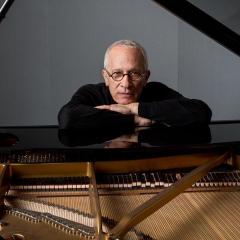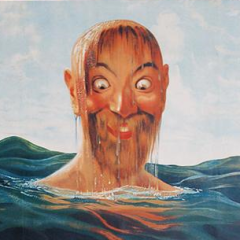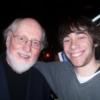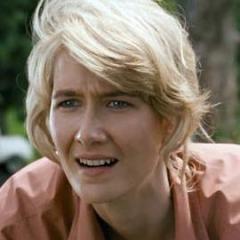-
Posts
5,848 -
Joined
-
Days Won
24
Reputation Activity
-
 The Illustrious Jerry got a reaction from bruce marshall in New Spielberg movie: The Fabelmans (2022)
The Illustrious Jerry got a reaction from bruce marshall in New Spielberg movie: The Fabelmans (2022)
My thoughts on the film and score:
Spielberg’s usual knack for sentimentality and wide-eyed wonder manifests itself so effortlessly in this tender autobiography about the healing power of art in a broken family. It feels like he’s been making movies for decades with this in the back of his mind, not as some grand end goal per se but as another big piece to fit comfortably into the later chapters of his oeuvre. There has always been a little spot in his filmography left open for this one. Those skeptical about the material will be happy to know that it plays less like the stock coming-of-age-meets-homage-to-cinema vanity project that you’re probably thinking of and more like a warm and fuzzy flicker of home movie memories from the all-time great.
The first hour or so is as close as the film gets to saccharine, not so much sweetened as it is a little corny, but never cloying. For anyone allergic to Spielberg in that general mode, this won’t change your attitude. The film fittingly grows up over the runtime, but still skillfully walks the bittersweet line between the dramatic weight and the tongue-in-cheek dorkiness of Spielberg’s youth from the get-go. It’s never self-serious and has a good sense of humour about itself without compromising the emotional resonance of the familial tensions. If anything, the lightness authenticates it. I’m not sure if it was just emphasized by the receptive festival crowd, but this might actually be one of Spielberg’s funniest, filled with lots of naturalistic sibling banter, interjections from old Jewish relatives, and the usual awkward teen moments. The monkey is good too!
After the wide-shot flourish of West Side Story, which naturally saw him throw his whole cinematic toolbox up onto the screen, Spielberg’s direction scales back and excels in the light touch of his patented formal economy. He’s still bringing the goods as necessary, from a couple of lasting compositions to one incredibly memorable visual gag, but don’t go in expecting any show-stopping long-takes. Ultimately the heart of the film is the script, co-authored by Tony Kushner but so clearly a personal outlet for Spielberg. Sure, the recreated anecdotes will be familiar to admirers of his work, but there’s a whole groundwork of thematic subtext there to deepen the scenes that would otherwise have us pointing at the screen DiCaprio-style. In fact, it's pretty remarkable how well so much of the stuff I "recognized" translates to the screen without that embarrassing feeling that it’s only there for the sake of it.
The performances are really solid in an ensemble sort of way. Obviously Paul Dano and Michelle Williams as the parents goes without saying, but the main guy who plays Spielberg at high school age is actually really good too. I recall some of the early reactions mentioning Licorice Pizza as a reference, which makes some sense considering how certain characters will just wander in, own the movie for a few minutes, and then leave (Judd Hirsch and David Lynch, baby!). Fortunately, that’s as far as the comparison goes though. I didn’t like the rose-coloured glasses the PTA film insisted on wearing but no matter here.
Just as my film brain is always focusing on the camera movement and editing, my film score ears are tuned in to catch and place as much music as possible. Williams’ score is sparse but thoughtfully spotted and quite elegant in a sombre way, as KK has already mentioned. My estimate is probably not much more than a half-hour of original music, if even that much. It’s possible Williams wrote and recorded some other suites or arrangements intended for the album, but otherwise I imagine the OST will be a combination of licensed music and original score. There are a couple period needledrops from the radio, a number of classical piano pieces played by his mother (credits listed Satie’s Gymnopedie, and others by Beethoven, Haydn, and maybe Bach), as well as some diegetic Western music heard on records during the movie screenings (I recognized the villain theme from Bernstein’s The Magnificent Seven and the title melody from Newman’s How The West Was Won, credits also listed something by Victor Young, Max Steiner’s The Searchers, and more Alfred Newman- Captain From Castile may have been it). As far as Williams’ score goes, there’s one main idea for celeste, strings, harp, and what I think was an oboe or clarinet. It appears about three times in the film proper, and is also the basis for the 4 to 5-minute end credits suite, which is a unique recording and the longest piece of music altogether. That one is sure to get a lot of plays. All the players are listed, including a standard string section, french horns, and soloists on piano, celeste, and guitar. Whoever drew the Book Thief comparison was about as close as they could have gotten, even though this is still pretty unique territory from a functional standpoint. Being reminded of Williams' grace and deftness after the sequel trilogy years of wall-to-wall tentpole scoring is of course another testament to his genius. Certainly worth a closer listen.
Anyway, it was really cool to attend a TIFF screening for the first time and to have it be the new Spielberg/Williams collaboration of all things. I’ll definitely be seeing this again in November. My favourite part was the post-credits stinger where a silhouetted man clearly wearing a turtleneck appears in a doorway and we get a booming, "Hey Stevie, baby!" accompanied by a bass pizzicato Jaws theme before it cuts to black. Seriously though, count me as a Fabel-fan.
-
 The Illustrious Jerry got a reaction from Bayesian in New Spielberg movie: The Fabelmans (2022)
The Illustrious Jerry got a reaction from Bayesian in New Spielberg movie: The Fabelmans (2022)
My thoughts on the film and score:
Spielberg’s usual knack for sentimentality and wide-eyed wonder manifests itself so effortlessly in this tender autobiography about the healing power of art in a broken family. It feels like he’s been making movies for decades with this in the back of his mind, not as some grand end goal per se but as another big piece to fit comfortably into the later chapters of his oeuvre. There has always been a little spot in his filmography left open for this one. Those skeptical about the material will be happy to know that it plays less like the stock coming-of-age-meets-homage-to-cinema vanity project that you’re probably thinking of and more like a warm and fuzzy flicker of home movie memories from the all-time great.
The first hour or so is as close as the film gets to saccharine, not so much sweetened as it is a little corny, but never cloying. For anyone allergic to Spielberg in that general mode, this won’t change your attitude. The film fittingly grows up over the runtime, but still skillfully walks the bittersweet line between the dramatic weight and the tongue-in-cheek dorkiness of Spielberg’s youth from the get-go. It’s never self-serious and has a good sense of humour about itself without compromising the emotional resonance of the familial tensions. If anything, the lightness authenticates it. I’m not sure if it was just emphasized by the receptive festival crowd, but this might actually be one of Spielberg’s funniest, filled with lots of naturalistic sibling banter, interjections from old Jewish relatives, and the usual awkward teen moments. The monkey is good too!
After the wide-shot flourish of West Side Story, which naturally saw him throw his whole cinematic toolbox up onto the screen, Spielberg’s direction scales back and excels in the light touch of his patented formal economy. He’s still bringing the goods as necessary, from a couple of lasting compositions to one incredibly memorable visual gag, but don’t go in expecting any show-stopping long-takes. Ultimately the heart of the film is the script, co-authored by Tony Kushner but so clearly a personal outlet for Spielberg. Sure, the recreated anecdotes will be familiar to admirers of his work, but there’s a whole groundwork of thematic subtext there to deepen the scenes that would otherwise have us pointing at the screen DiCaprio-style. In fact, it's pretty remarkable how well so much of the stuff I "recognized" translates to the screen without that embarrassing feeling that it’s only there for the sake of it.
The performances are really solid in an ensemble sort of way. Obviously Paul Dano and Michelle Williams as the parents goes without saying, but the main guy who plays Spielberg at high school age is actually really good too. I recall some of the early reactions mentioning Licorice Pizza as a reference, which makes some sense considering how certain characters will just wander in, own the movie for a few minutes, and then leave (Judd Hirsch and David Lynch, baby!). Fortunately, that’s as far as the comparison goes though. I didn’t like the rose-coloured glasses the PTA film insisted on wearing but no matter here.
Just as my film brain is always focusing on the camera movement and editing, my film score ears are tuned in to catch and place as much music as possible. Williams’ score is sparse but thoughtfully spotted and quite elegant in a sombre way, as KK has already mentioned. My estimate is probably not much more than a half-hour of original music, if even that much. It’s possible Williams wrote and recorded some other suites or arrangements intended for the album, but otherwise I imagine the OST will be a combination of licensed music and original score. There are a couple period needledrops from the radio, a number of classical piano pieces played by his mother (credits listed Satie’s Gymnopedie, and others by Beethoven, Haydn, and maybe Bach), as well as some diegetic Western music heard on records during the movie screenings (I recognized the villain theme from Bernstein’s The Magnificent Seven and the title melody from Newman’s How The West Was Won, credits also listed something by Victor Young, Max Steiner’s The Searchers, and more Alfred Newman- Captain From Castile may have been it). As far as Williams’ score goes, there’s one main idea for celeste, strings, harp, and what I think was an oboe or clarinet. It appears about three times in the film proper, and is also the basis for the 4 to 5-minute end credits suite, which is a unique recording and the longest piece of music altogether. That one is sure to get a lot of plays. All the players are listed, including a standard string section, french horns, and soloists on piano, celeste, and guitar. Whoever drew the Book Thief comparison was about as close as they could have gotten, even though this is still pretty unique territory from a functional standpoint. Being reminded of Williams' grace and deftness after the sequel trilogy years of wall-to-wall tentpole scoring is of course another testament to his genius. Certainly worth a closer listen.
Anyway, it was really cool to attend a TIFF screening for the first time and to have it be the new Spielberg/Williams collaboration of all things. I’ll definitely be seeing this again in November. My favourite part was the post-credits stinger where a silhouetted man clearly wearing a turtleneck appears in a doorway and we get a booming, "Hey Stevie, baby!" accompanied by a bass pizzicato Jaws theme before it cuts to black. Seriously though, count me as a Fabel-fan.
-
 The Illustrious Jerry got a reaction from Andy in New Spielberg movie: The Fabelmans (2022)
The Illustrious Jerry got a reaction from Andy in New Spielberg movie: The Fabelmans (2022)
My thoughts on the film and score:
Spielberg’s usual knack for sentimentality and wide-eyed wonder manifests itself so effortlessly in this tender autobiography about the healing power of art in a broken family. It feels like he’s been making movies for decades with this in the back of his mind, not as some grand end goal per se but as another big piece to fit comfortably into the later chapters of his oeuvre. There has always been a little spot in his filmography left open for this one. Those skeptical about the material will be happy to know that it plays less like the stock coming-of-age-meets-homage-to-cinema vanity project that you’re probably thinking of and more like a warm and fuzzy flicker of home movie memories from the all-time great.
The first hour or so is as close as the film gets to saccharine, not so much sweetened as it is a little corny, but never cloying. For anyone allergic to Spielberg in that general mode, this won’t change your attitude. The film fittingly grows up over the runtime, but still skillfully walks the bittersweet line between the dramatic weight and the tongue-in-cheek dorkiness of Spielberg’s youth from the get-go. It’s never self-serious and has a good sense of humour about itself without compromising the emotional resonance of the familial tensions. If anything, the lightness authenticates it. I’m not sure if it was just emphasized by the receptive festival crowd, but this might actually be one of Spielberg’s funniest, filled with lots of naturalistic sibling banter, interjections from old Jewish relatives, and the usual awkward teen moments. The monkey is good too!
After the wide-shot flourish of West Side Story, which naturally saw him throw his whole cinematic toolbox up onto the screen, Spielberg’s direction scales back and excels in the light touch of his patented formal economy. He’s still bringing the goods as necessary, from a couple of lasting compositions to one incredibly memorable visual gag, but don’t go in expecting any show-stopping long-takes. Ultimately the heart of the film is the script, co-authored by Tony Kushner but so clearly a personal outlet for Spielberg. Sure, the recreated anecdotes will be familiar to admirers of his work, but there’s a whole groundwork of thematic subtext there to deepen the scenes that would otherwise have us pointing at the screen DiCaprio-style. In fact, it's pretty remarkable how well so much of the stuff I "recognized" translates to the screen without that embarrassing feeling that it’s only there for the sake of it.
The performances are really solid in an ensemble sort of way. Obviously Paul Dano and Michelle Williams as the parents goes without saying, but the main guy who plays Spielberg at high school age is actually really good too. I recall some of the early reactions mentioning Licorice Pizza as a reference, which makes some sense considering how certain characters will just wander in, own the movie for a few minutes, and then leave (Judd Hirsch and David Lynch, baby!). Fortunately, that’s as far as the comparison goes though. I didn’t like the rose-coloured glasses the PTA film insisted on wearing but no matter here.
Just as my film brain is always focusing on the camera movement and editing, my film score ears are tuned in to catch and place as much music as possible. Williams’ score is sparse but thoughtfully spotted and quite elegant in a sombre way, as KK has already mentioned. My estimate is probably not much more than a half-hour of original music, if even that much. It’s possible Williams wrote and recorded some other suites or arrangements intended for the album, but otherwise I imagine the OST will be a combination of licensed music and original score. There are a couple period needledrops from the radio, a number of classical piano pieces played by his mother (credits listed Satie’s Gymnopedie, and others by Beethoven, Haydn, and maybe Bach), as well as some diegetic Western music heard on records during the movie screenings (I recognized the villain theme from Bernstein’s The Magnificent Seven and the title melody from Newman’s How The West Was Won, credits also listed something by Victor Young, Max Steiner’s The Searchers, and more Alfred Newman- Captain From Castile may have been it). As far as Williams’ score goes, there’s one main idea for celeste, strings, harp, and what I think was an oboe or clarinet. It appears about three times in the film proper, and is also the basis for the 4 to 5-minute end credits suite, which is a unique recording and the longest piece of music altogether. That one is sure to get a lot of plays. All the players are listed, including a standard string section, french horns, and soloists on piano, celeste, and guitar. Whoever drew the Book Thief comparison was about as close as they could have gotten, even though this is still pretty unique territory from a functional standpoint. Being reminded of Williams' grace and deftness after the sequel trilogy years of wall-to-wall tentpole scoring is of course another testament to his genius. Certainly worth a closer listen.
Anyway, it was really cool to attend a TIFF screening for the first time and to have it be the new Spielberg/Williams collaboration of all things. I’ll definitely be seeing this again in November. My favourite part was the post-credits stinger where a silhouetted man clearly wearing a turtleneck appears in a doorway and we get a booming, "Hey Stevie, baby!" accompanied by a bass pizzicato Jaws theme before it cuts to black. Seriously though, count me as a Fabel-fan.
-
 The Illustrious Jerry got a reaction from Toillion in New Spielberg movie: The Fabelmans (2022)
The Illustrious Jerry got a reaction from Toillion in New Spielberg movie: The Fabelmans (2022)
My thoughts on the film and score:
Spielberg’s usual knack for sentimentality and wide-eyed wonder manifests itself so effortlessly in this tender autobiography about the healing power of art in a broken family. It feels like he’s been making movies for decades with this in the back of his mind, not as some grand end goal per se but as another big piece to fit comfortably into the later chapters of his oeuvre. There has always been a little spot in his filmography left open for this one. Those skeptical about the material will be happy to know that it plays less like the stock coming-of-age-meets-homage-to-cinema vanity project that you’re probably thinking of and more like a warm and fuzzy flicker of home movie memories from the all-time great.
The first hour or so is as close as the film gets to saccharine, not so much sweetened as it is a little corny, but never cloying. For anyone allergic to Spielberg in that general mode, this won’t change your attitude. The film fittingly grows up over the runtime, but still skillfully walks the bittersweet line between the dramatic weight and the tongue-in-cheek dorkiness of Spielberg’s youth from the get-go. It’s never self-serious and has a good sense of humour about itself without compromising the emotional resonance of the familial tensions. If anything, the lightness authenticates it. I’m not sure if it was just emphasized by the receptive festival crowd, but this might actually be one of Spielberg’s funniest, filled with lots of naturalistic sibling banter, interjections from old Jewish relatives, and the usual awkward teen moments. The monkey is good too!
After the wide-shot flourish of West Side Story, which naturally saw him throw his whole cinematic toolbox up onto the screen, Spielberg’s direction scales back and excels in the light touch of his patented formal economy. He’s still bringing the goods as necessary, from a couple of lasting compositions to one incredibly memorable visual gag, but don’t go in expecting any show-stopping long-takes. Ultimately the heart of the film is the script, co-authored by Tony Kushner but so clearly a personal outlet for Spielberg. Sure, the recreated anecdotes will be familiar to admirers of his work, but there’s a whole groundwork of thematic subtext there to deepen the scenes that would otherwise have us pointing at the screen DiCaprio-style. In fact, it's pretty remarkable how well so much of the stuff I "recognized" translates to the screen without that embarrassing feeling that it’s only there for the sake of it.
The performances are really solid in an ensemble sort of way. Obviously Paul Dano and Michelle Williams as the parents goes without saying, but the main guy who plays Spielberg at high school age is actually really good too. I recall some of the early reactions mentioning Licorice Pizza as a reference, which makes some sense considering how certain characters will just wander in, own the movie for a few minutes, and then leave (Judd Hirsch and David Lynch, baby!). Fortunately, that’s as far as the comparison goes though. I didn’t like the rose-coloured glasses the PTA film insisted on wearing but no matter here.
Just as my film brain is always focusing on the camera movement and editing, my film score ears are tuned in to catch and place as much music as possible. Williams’ score is sparse but thoughtfully spotted and quite elegant in a sombre way, as KK has already mentioned. My estimate is probably not much more than a half-hour of original music, if even that much. It’s possible Williams wrote and recorded some other suites or arrangements intended for the album, but otherwise I imagine the OST will be a combination of licensed music and original score. There are a couple period needledrops from the radio, a number of classical piano pieces played by his mother (credits listed Satie’s Gymnopedie, and others by Beethoven, Haydn, and maybe Bach), as well as some diegetic Western music heard on records during the movie screenings (I recognized the villain theme from Bernstein’s The Magnificent Seven and the title melody from Newman’s How The West Was Won, credits also listed something by Victor Young, Max Steiner’s The Searchers, and more Alfred Newman- Captain From Castile may have been it). As far as Williams’ score goes, there’s one main idea for celeste, strings, harp, and what I think was an oboe or clarinet. It appears about three times in the film proper, and is also the basis for the 4 to 5-minute end credits suite, which is a unique recording and the longest piece of music altogether. That one is sure to get a lot of plays. All the players are listed, including a standard string section, french horns, and soloists on piano, celeste, and guitar. Whoever drew the Book Thief comparison was about as close as they could have gotten, even though this is still pretty unique territory from a functional standpoint. Being reminded of Williams' grace and deftness after the sequel trilogy years of wall-to-wall tentpole scoring is of course another testament to his genius. Certainly worth a closer listen.
Anyway, it was really cool to attend a TIFF screening for the first time and to have it be the new Spielberg/Williams collaboration of all things. I’ll definitely be seeing this again in November. My favourite part was the post-credits stinger where a silhouetted man clearly wearing a turtleneck appears in a doorway and we get a booming, "Hey Stevie, baby!" accompanied by a bass pizzicato Jaws theme before it cuts to black. Seriously though, count me as a Fabel-fan.
-
 The Illustrious Jerry got a reaction from enderdrag64 in New Spielberg movie: The Fabelmans (2022)
The Illustrious Jerry got a reaction from enderdrag64 in New Spielberg movie: The Fabelmans (2022)
My thoughts on the film and score:
Spielberg’s usual knack for sentimentality and wide-eyed wonder manifests itself so effortlessly in this tender autobiography about the healing power of art in a broken family. It feels like he’s been making movies for decades with this in the back of his mind, not as some grand end goal per se but as another big piece to fit comfortably into the later chapters of his oeuvre. There has always been a little spot in his filmography left open for this one. Those skeptical about the material will be happy to know that it plays less like the stock coming-of-age-meets-homage-to-cinema vanity project that you’re probably thinking of and more like a warm and fuzzy flicker of home movie memories from the all-time great.
The first hour or so is as close as the film gets to saccharine, not so much sweetened as it is a little corny, but never cloying. For anyone allergic to Spielberg in that general mode, this won’t change your attitude. The film fittingly grows up over the runtime, but still skillfully walks the bittersweet line between the dramatic weight and the tongue-in-cheek dorkiness of Spielberg’s youth from the get-go. It’s never self-serious and has a good sense of humour about itself without compromising the emotional resonance of the familial tensions. If anything, the lightness authenticates it. I’m not sure if it was just emphasized by the receptive festival crowd, but this might actually be one of Spielberg’s funniest, filled with lots of naturalistic sibling banter, interjections from old Jewish relatives, and the usual awkward teen moments. The monkey is good too!
After the wide-shot flourish of West Side Story, which naturally saw him throw his whole cinematic toolbox up onto the screen, Spielberg’s direction scales back and excels in the light touch of his patented formal economy. He’s still bringing the goods as necessary, from a couple of lasting compositions to one incredibly memorable visual gag, but don’t go in expecting any show-stopping long-takes. Ultimately the heart of the film is the script, co-authored by Tony Kushner but so clearly a personal outlet for Spielberg. Sure, the recreated anecdotes will be familiar to admirers of his work, but there’s a whole groundwork of thematic subtext there to deepen the scenes that would otherwise have us pointing at the screen DiCaprio-style. In fact, it's pretty remarkable how well so much of the stuff I "recognized" translates to the screen without that embarrassing feeling that it’s only there for the sake of it.
The performances are really solid in an ensemble sort of way. Obviously Paul Dano and Michelle Williams as the parents goes without saying, but the main guy who plays Spielberg at high school age is actually really good too. I recall some of the early reactions mentioning Licorice Pizza as a reference, which makes some sense considering how certain characters will just wander in, own the movie for a few minutes, and then leave (Judd Hirsch and David Lynch, baby!). Fortunately, that’s as far as the comparison goes though. I didn’t like the rose-coloured glasses the PTA film insisted on wearing but no matter here.
Just as my film brain is always focusing on the camera movement and editing, my film score ears are tuned in to catch and place as much music as possible. Williams’ score is sparse but thoughtfully spotted and quite elegant in a sombre way, as KK has already mentioned. My estimate is probably not much more than a half-hour of original music, if even that much. It’s possible Williams wrote and recorded some other suites or arrangements intended for the album, but otherwise I imagine the OST will be a combination of licensed music and original score. There are a couple period needledrops from the radio, a number of classical piano pieces played by his mother (credits listed Satie’s Gymnopedie, and others by Beethoven, Haydn, and maybe Bach), as well as some diegetic Western music heard on records during the movie screenings (I recognized the villain theme from Bernstein’s The Magnificent Seven and the title melody from Newman’s How The West Was Won, credits also listed something by Victor Young, Max Steiner’s The Searchers, and more Alfred Newman- Captain From Castile may have been it). As far as Williams’ score goes, there’s one main idea for celeste, strings, harp, and what I think was an oboe or clarinet. It appears about three times in the film proper, and is also the basis for the 4 to 5-minute end credits suite, which is a unique recording and the longest piece of music altogether. That one is sure to get a lot of plays. All the players are listed, including a standard string section, french horns, and soloists on piano, celeste, and guitar. Whoever drew the Book Thief comparison was about as close as they could have gotten, even though this is still pretty unique territory from a functional standpoint. Being reminded of Williams' grace and deftness after the sequel trilogy years of wall-to-wall tentpole scoring is of course another testament to his genius. Certainly worth a closer listen.
Anyway, it was really cool to attend a TIFF screening for the first time and to have it be the new Spielberg/Williams collaboration of all things. I’ll definitely be seeing this again in November. My favourite part was the post-credits stinger where a silhouetted man clearly wearing a turtleneck appears in a doorway and we get a booming, "Hey Stevie, baby!" accompanied by a bass pizzicato Jaws theme before it cuts to black. Seriously though, count me as a Fabel-fan.
-
 The Illustrious Jerry got a reaction from Disco Stu in New Spielberg movie: The Fabelmans (2022)
The Illustrious Jerry got a reaction from Disco Stu in New Spielberg movie: The Fabelmans (2022)
My thoughts on the film and score:
Spielberg’s usual knack for sentimentality and wide-eyed wonder manifests itself so effortlessly in this tender autobiography about the healing power of art in a broken family. It feels like he’s been making movies for decades with this in the back of his mind, not as some grand end goal per se but as another big piece to fit comfortably into the later chapters of his oeuvre. There has always been a little spot in his filmography left open for this one. Those skeptical about the material will be happy to know that it plays less like the stock coming-of-age-meets-homage-to-cinema vanity project that you’re probably thinking of and more like a warm and fuzzy flicker of home movie memories from the all-time great.
The first hour or so is as close as the film gets to saccharine, not so much sweetened as it is a little corny, but never cloying. For anyone allergic to Spielberg in that general mode, this won’t change your attitude. The film fittingly grows up over the runtime, but still skillfully walks the bittersweet line between the dramatic weight and the tongue-in-cheek dorkiness of Spielberg’s youth from the get-go. It’s never self-serious and has a good sense of humour about itself without compromising the emotional resonance of the familial tensions. If anything, the lightness authenticates it. I’m not sure if it was just emphasized by the receptive festival crowd, but this might actually be one of Spielberg’s funniest, filled with lots of naturalistic sibling banter, interjections from old Jewish relatives, and the usual awkward teen moments. The monkey is good too!
After the wide-shot flourish of West Side Story, which naturally saw him throw his whole cinematic toolbox up onto the screen, Spielberg’s direction scales back and excels in the light touch of his patented formal economy. He’s still bringing the goods as necessary, from a couple of lasting compositions to one incredibly memorable visual gag, but don’t go in expecting any show-stopping long-takes. Ultimately the heart of the film is the script, co-authored by Tony Kushner but so clearly a personal outlet for Spielberg. Sure, the recreated anecdotes will be familiar to admirers of his work, but there’s a whole groundwork of thematic subtext there to deepen the scenes that would otherwise have us pointing at the screen DiCaprio-style. In fact, it's pretty remarkable how well so much of the stuff I "recognized" translates to the screen without that embarrassing feeling that it’s only there for the sake of it.
The performances are really solid in an ensemble sort of way. Obviously Paul Dano and Michelle Williams as the parents goes without saying, but the main guy who plays Spielberg at high school age is actually really good too. I recall some of the early reactions mentioning Licorice Pizza as a reference, which makes some sense considering how certain characters will just wander in, own the movie for a few minutes, and then leave (Judd Hirsch and David Lynch, baby!). Fortunately, that’s as far as the comparison goes though. I didn’t like the rose-coloured glasses the PTA film insisted on wearing but no matter here.
Just as my film brain is always focusing on the camera movement and editing, my film score ears are tuned in to catch and place as much music as possible. Williams’ score is sparse but thoughtfully spotted and quite elegant in a sombre way, as KK has already mentioned. My estimate is probably not much more than a half-hour of original music, if even that much. It’s possible Williams wrote and recorded some other suites or arrangements intended for the album, but otherwise I imagine the OST will be a combination of licensed music and original score. There are a couple period needledrops from the radio, a number of classical piano pieces played by his mother (credits listed Satie’s Gymnopedie, and others by Beethoven, Haydn, and maybe Bach), as well as some diegetic Western music heard on records during the movie screenings (I recognized the villain theme from Bernstein’s The Magnificent Seven and the title melody from Newman’s How The West Was Won, credits also listed something by Victor Young, Max Steiner’s The Searchers, and more Alfred Newman- Captain From Castile may have been it). As far as Williams’ score goes, there’s one main idea for celeste, strings, harp, and what I think was an oboe or clarinet. It appears about three times in the film proper, and is also the basis for the 4 to 5-minute end credits suite, which is a unique recording and the longest piece of music altogether. That one is sure to get a lot of plays. All the players are listed, including a standard string section, french horns, and soloists on piano, celeste, and guitar. Whoever drew the Book Thief comparison was about as close as they could have gotten, even though this is still pretty unique territory from a functional standpoint. Being reminded of Williams' grace and deftness after the sequel trilogy years of wall-to-wall tentpole scoring is of course another testament to his genius. Certainly worth a closer listen.
Anyway, it was really cool to attend a TIFF screening for the first time and to have it be the new Spielberg/Williams collaboration of all things. I’ll definitely be seeing this again in November. My favourite part was the post-credits stinger where a silhouetted man clearly wearing a turtleneck appears in a doorway and we get a booming, "Hey Stevie, baby!" accompanied by a bass pizzicato Jaws theme before it cuts to black. Seriously though, count me as a Fabel-fan.
-
 The Illustrious Jerry got a reaction from KK in New Spielberg movie: The Fabelmans (2022)
The Illustrious Jerry got a reaction from KK in New Spielberg movie: The Fabelmans (2022)
My thoughts on the film and score:
Spielberg’s usual knack for sentimentality and wide-eyed wonder manifests itself so effortlessly in this tender autobiography about the healing power of art in a broken family. It feels like he’s been making movies for decades with this in the back of his mind, not as some grand end goal per se but as another big piece to fit comfortably into the later chapters of his oeuvre. There has always been a little spot in his filmography left open for this one. Those skeptical about the material will be happy to know that it plays less like the stock coming-of-age-meets-homage-to-cinema vanity project that you’re probably thinking of and more like a warm and fuzzy flicker of home movie memories from the all-time great.
The first hour or so is as close as the film gets to saccharine, not so much sweetened as it is a little corny, but never cloying. For anyone allergic to Spielberg in that general mode, this won’t change your attitude. The film fittingly grows up over the runtime, but still skillfully walks the bittersweet line between the dramatic weight and the tongue-in-cheek dorkiness of Spielberg’s youth from the get-go. It’s never self-serious and has a good sense of humour about itself without compromising the emotional resonance of the familial tensions. If anything, the lightness authenticates it. I’m not sure if it was just emphasized by the receptive festival crowd, but this might actually be one of Spielberg’s funniest, filled with lots of naturalistic sibling banter, interjections from old Jewish relatives, and the usual awkward teen moments. The monkey is good too!
After the wide-shot flourish of West Side Story, which naturally saw him throw his whole cinematic toolbox up onto the screen, Spielberg’s direction scales back and excels in the light touch of his patented formal economy. He’s still bringing the goods as necessary, from a couple of lasting compositions to one incredibly memorable visual gag, but don’t go in expecting any show-stopping long-takes. Ultimately the heart of the film is the script, co-authored by Tony Kushner but so clearly a personal outlet for Spielberg. Sure, the recreated anecdotes will be familiar to admirers of his work, but there’s a whole groundwork of thematic subtext there to deepen the scenes that would otherwise have us pointing at the screen DiCaprio-style. In fact, it's pretty remarkable how well so much of the stuff I "recognized" translates to the screen without that embarrassing feeling that it’s only there for the sake of it.
The performances are really solid in an ensemble sort of way. Obviously Paul Dano and Michelle Williams as the parents goes without saying, but the main guy who plays Spielberg at high school age is actually really good too. I recall some of the early reactions mentioning Licorice Pizza as a reference, which makes some sense considering how certain characters will just wander in, own the movie for a few minutes, and then leave (Judd Hirsch and David Lynch, baby!). Fortunately, that’s as far as the comparison goes though. I didn’t like the rose-coloured glasses the PTA film insisted on wearing but no matter here.
Just as my film brain is always focusing on the camera movement and editing, my film score ears are tuned in to catch and place as much music as possible. Williams’ score is sparse but thoughtfully spotted and quite elegant in a sombre way, as KK has already mentioned. My estimate is probably not much more than a half-hour of original music, if even that much. It’s possible Williams wrote and recorded some other suites or arrangements intended for the album, but otherwise I imagine the OST will be a combination of licensed music and original score. There are a couple period needledrops from the radio, a number of classical piano pieces played by his mother (credits listed Satie’s Gymnopedie, and others by Beethoven, Haydn, and maybe Bach), as well as some diegetic Western music heard on records during the movie screenings (I recognized the villain theme from Bernstein’s The Magnificent Seven and the title melody from Newman’s How The West Was Won, credits also listed something by Victor Young, Max Steiner’s The Searchers, and more Alfred Newman- Captain From Castile may have been it). As far as Williams’ score goes, there’s one main idea for celeste, strings, harp, and what I think was an oboe or clarinet. It appears about three times in the film proper, and is also the basis for the 4 to 5-minute end credits suite, which is a unique recording and the longest piece of music altogether. That one is sure to get a lot of plays. All the players are listed, including a standard string section, french horns, and soloists on piano, celeste, and guitar. Whoever drew the Book Thief comparison was about as close as they could have gotten, even though this is still pretty unique territory from a functional standpoint. Being reminded of Williams' grace and deftness after the sequel trilogy years of wall-to-wall tentpole scoring is of course another testament to his genius. Certainly worth a closer listen.
Anyway, it was really cool to attend a TIFF screening for the first time and to have it be the new Spielberg/Williams collaboration of all things. I’ll definitely be seeing this again in November. My favourite part was the post-credits stinger where a silhouetted man clearly wearing a turtleneck appears in a doorway and we get a booming, "Hey Stevie, baby!" accompanied by a bass pizzicato Jaws theme before it cuts to black. Seriously though, count me as a Fabel-fan.
-
 The Illustrious Jerry got a reaction from Tom in New Spielberg movie: The Fabelmans (2022)
The Illustrious Jerry got a reaction from Tom in New Spielberg movie: The Fabelmans (2022)
My thoughts on the film and score:
Spielberg’s usual knack for sentimentality and wide-eyed wonder manifests itself so effortlessly in this tender autobiography about the healing power of art in a broken family. It feels like he’s been making movies for decades with this in the back of his mind, not as some grand end goal per se but as another big piece to fit comfortably into the later chapters of his oeuvre. There has always been a little spot in his filmography left open for this one. Those skeptical about the material will be happy to know that it plays less like the stock coming-of-age-meets-homage-to-cinema vanity project that you’re probably thinking of and more like a warm and fuzzy flicker of home movie memories from the all-time great.
The first hour or so is as close as the film gets to saccharine, not so much sweetened as it is a little corny, but never cloying. For anyone allergic to Spielberg in that general mode, this won’t change your attitude. The film fittingly grows up over the runtime, but still skillfully walks the bittersweet line between the dramatic weight and the tongue-in-cheek dorkiness of Spielberg’s youth from the get-go. It’s never self-serious and has a good sense of humour about itself without compromising the emotional resonance of the familial tensions. If anything, the lightness authenticates it. I’m not sure if it was just emphasized by the receptive festival crowd, but this might actually be one of Spielberg’s funniest, filled with lots of naturalistic sibling banter, interjections from old Jewish relatives, and the usual awkward teen moments. The monkey is good too!
After the wide-shot flourish of West Side Story, which naturally saw him throw his whole cinematic toolbox up onto the screen, Spielberg’s direction scales back and excels in the light touch of his patented formal economy. He’s still bringing the goods as necessary, from a couple of lasting compositions to one incredibly memorable visual gag, but don’t go in expecting any show-stopping long-takes. Ultimately the heart of the film is the script, co-authored by Tony Kushner but so clearly a personal outlet for Spielberg. Sure, the recreated anecdotes will be familiar to admirers of his work, but there’s a whole groundwork of thematic subtext there to deepen the scenes that would otherwise have us pointing at the screen DiCaprio-style. In fact, it's pretty remarkable how well so much of the stuff I "recognized" translates to the screen without that embarrassing feeling that it’s only there for the sake of it.
The performances are really solid in an ensemble sort of way. Obviously Paul Dano and Michelle Williams as the parents goes without saying, but the main guy who plays Spielberg at high school age is actually really good too. I recall some of the early reactions mentioning Licorice Pizza as a reference, which makes some sense considering how certain characters will just wander in, own the movie for a few minutes, and then leave (Judd Hirsch and David Lynch, baby!). Fortunately, that’s as far as the comparison goes though. I didn’t like the rose-coloured glasses the PTA film insisted on wearing but no matter here.
Just as my film brain is always focusing on the camera movement and editing, my film score ears are tuned in to catch and place as much music as possible. Williams’ score is sparse but thoughtfully spotted and quite elegant in a sombre way, as KK has already mentioned. My estimate is probably not much more than a half-hour of original music, if even that much. It’s possible Williams wrote and recorded some other suites or arrangements intended for the album, but otherwise I imagine the OST will be a combination of licensed music and original score. There are a couple period needledrops from the radio, a number of classical piano pieces played by his mother (credits listed Satie’s Gymnopedie, and others by Beethoven, Haydn, and maybe Bach), as well as some diegetic Western music heard on records during the movie screenings (I recognized the villain theme from Bernstein’s The Magnificent Seven and the title melody from Newman’s How The West Was Won, credits also listed something by Victor Young, Max Steiner’s The Searchers, and more Alfred Newman- Captain From Castile may have been it). As far as Williams’ score goes, there’s one main idea for celeste, strings, harp, and what I think was an oboe or clarinet. It appears about three times in the film proper, and is also the basis for the 4 to 5-minute end credits suite, which is a unique recording and the longest piece of music altogether. That one is sure to get a lot of plays. All the players are listed, including a standard string section, french horns, and soloists on piano, celeste, and guitar. Whoever drew the Book Thief comparison was about as close as they could have gotten, even though this is still pretty unique territory from a functional standpoint. Being reminded of Williams' grace and deftness after the sequel trilogy years of wall-to-wall tentpole scoring is of course another testament to his genius. Certainly worth a closer listen.
Anyway, it was really cool to attend a TIFF screening for the first time and to have it be the new Spielberg/Williams collaboration of all things. I’ll definitely be seeing this again in November. My favourite part was the post-credits stinger where a silhouetted man clearly wearing a turtleneck appears in a doorway and we get a booming, "Hey Stevie, baby!" accompanied by a bass pizzicato Jaws theme before it cuts to black. Seriously though, count me as a Fabel-fan.
-
 The Illustrious Jerry got a reaction from Ludwig in New Spielberg movie: The Fabelmans (2022)
The Illustrious Jerry got a reaction from Ludwig in New Spielberg movie: The Fabelmans (2022)
My thoughts on the film and score:
Spielberg’s usual knack for sentimentality and wide-eyed wonder manifests itself so effortlessly in this tender autobiography about the healing power of art in a broken family. It feels like he’s been making movies for decades with this in the back of his mind, not as some grand end goal per se but as another big piece to fit comfortably into the later chapters of his oeuvre. There has always been a little spot in his filmography left open for this one. Those skeptical about the material will be happy to know that it plays less like the stock coming-of-age-meets-homage-to-cinema vanity project that you’re probably thinking of and more like a warm and fuzzy flicker of home movie memories from the all-time great.
The first hour or so is as close as the film gets to saccharine, not so much sweetened as it is a little corny, but never cloying. For anyone allergic to Spielberg in that general mode, this won’t change your attitude. The film fittingly grows up over the runtime, but still skillfully walks the bittersweet line between the dramatic weight and the tongue-in-cheek dorkiness of Spielberg’s youth from the get-go. It’s never self-serious and has a good sense of humour about itself without compromising the emotional resonance of the familial tensions. If anything, the lightness authenticates it. I’m not sure if it was just emphasized by the receptive festival crowd, but this might actually be one of Spielberg’s funniest, filled with lots of naturalistic sibling banter, interjections from old Jewish relatives, and the usual awkward teen moments. The monkey is good too!
After the wide-shot flourish of West Side Story, which naturally saw him throw his whole cinematic toolbox up onto the screen, Spielberg’s direction scales back and excels in the light touch of his patented formal economy. He’s still bringing the goods as necessary, from a couple of lasting compositions to one incredibly memorable visual gag, but don’t go in expecting any show-stopping long-takes. Ultimately the heart of the film is the script, co-authored by Tony Kushner but so clearly a personal outlet for Spielberg. Sure, the recreated anecdotes will be familiar to admirers of his work, but there’s a whole groundwork of thematic subtext there to deepen the scenes that would otherwise have us pointing at the screen DiCaprio-style. In fact, it's pretty remarkable how well so much of the stuff I "recognized" translates to the screen without that embarrassing feeling that it’s only there for the sake of it.
The performances are really solid in an ensemble sort of way. Obviously Paul Dano and Michelle Williams as the parents goes without saying, but the main guy who plays Spielberg at high school age is actually really good too. I recall some of the early reactions mentioning Licorice Pizza as a reference, which makes some sense considering how certain characters will just wander in, own the movie for a few minutes, and then leave (Judd Hirsch and David Lynch, baby!). Fortunately, that’s as far as the comparison goes though. I didn’t like the rose-coloured glasses the PTA film insisted on wearing but no matter here.
Just as my film brain is always focusing on the camera movement and editing, my film score ears are tuned in to catch and place as much music as possible. Williams’ score is sparse but thoughtfully spotted and quite elegant in a sombre way, as KK has already mentioned. My estimate is probably not much more than a half-hour of original music, if even that much. It’s possible Williams wrote and recorded some other suites or arrangements intended for the album, but otherwise I imagine the OST will be a combination of licensed music and original score. There are a couple period needledrops from the radio, a number of classical piano pieces played by his mother (credits listed Satie’s Gymnopedie, and others by Beethoven, Haydn, and maybe Bach), as well as some diegetic Western music heard on records during the movie screenings (I recognized the villain theme from Bernstein’s The Magnificent Seven and the title melody from Newman’s How The West Was Won, credits also listed something by Victor Young, Max Steiner’s The Searchers, and more Alfred Newman- Captain From Castile may have been it). As far as Williams’ score goes, there’s one main idea for celeste, strings, harp, and what I think was an oboe or clarinet. It appears about three times in the film proper, and is also the basis for the 4 to 5-minute end credits suite, which is a unique recording and the longest piece of music altogether. That one is sure to get a lot of plays. All the players are listed, including a standard string section, french horns, and soloists on piano, celeste, and guitar. Whoever drew the Book Thief comparison was about as close as they could have gotten, even though this is still pretty unique territory from a functional standpoint. Being reminded of Williams' grace and deftness after the sequel trilogy years of wall-to-wall tentpole scoring is of course another testament to his genius. Certainly worth a closer listen.
Anyway, it was really cool to attend a TIFF screening for the first time and to have it be the new Spielberg/Williams collaboration of all things. I’ll definitely be seeing this again in November. My favourite part was the post-credits stinger where a silhouetted man clearly wearing a turtleneck appears in a doorway and we get a booming, "Hey Stevie, baby!" accompanied by a bass pizzicato Jaws theme before it cuts to black. Seriously though, count me as a Fabel-fan.
-
 The Illustrious Jerry reacted to Disco Stu in Justin Hurwitz's Babylon (2022)
The Illustrious Jerry reacted to Disco Stu in Justin Hurwitz's Babylon (2022)
I am very excited for this score and film.
-

-
 The Illustrious Jerry reacted to mrbellamy in The Fabelmans - score mentions in film reviews
The Illustrious Jerry reacted to mrbellamy in The Fabelmans - score mentions in film reviews
Honestly at this point I'm not against just locking Fabelmans threads until the thing is out, Christ almighty
-
 The Illustrious Jerry got a reaction from Will in New Spielberg movie: The Fabelmans (2022)
The Illustrious Jerry got a reaction from Will in New Spielberg movie: The Fabelmans (2022)
I will be seeing a TIFF screening of this film on September 17th. I've actually never been to the festival in any capacity and am very excited for the experience! I mean, what could be more special than the latest Spielberg/Williams collaboration?
Looking forward to reporting back in a couple of weeks!
-
 The Illustrious Jerry got a reaction from blondheim in New Spielberg movie: The Fabelmans (2022)
The Illustrious Jerry got a reaction from blondheim in New Spielberg movie: The Fabelmans (2022)
I will be seeing a TIFF screening of this film on September 17th. I've actually never been to the festival in any capacity and am very excited for the experience! I mean, what could be more special than the latest Spielberg/Williams collaboration?
Looking forward to reporting back in a couple of weeks!
-
 The Illustrious Jerry got a reaction from Muad'Dib in New Spielberg movie: The Fabelmans (2022)
The Illustrious Jerry got a reaction from Muad'Dib in New Spielberg movie: The Fabelmans (2022)
I will be seeing a TIFF screening of this film on September 17th. I've actually never been to the festival in any capacity and am very excited for the experience! I mean, what could be more special than the latest Spielberg/Williams collaboration?
Looking forward to reporting back in a couple of weeks!
-
 The Illustrious Jerry got a reaction from Once in New Spielberg movie: The Fabelmans (2022)
The Illustrious Jerry got a reaction from Once in New Spielberg movie: The Fabelmans (2022)
I will be seeing a TIFF screening of this film on September 17th. I've actually never been to the festival in any capacity and am very excited for the experience! I mean, what could be more special than the latest Spielberg/Williams collaboration?
Looking forward to reporting back in a couple of weeks!
-
 The Illustrious Jerry reacted to Disco Stu in Bear McCreary's The Lord Of The Rings: The Rings of Power (2022)
The Illustrious Jerry reacted to Disco Stu in Bear McCreary's The Lord Of The Rings: The Rings of Power (2022)
If only they hadn’t quit that trend
-
 The Illustrious Jerry got a reaction from crumbs in New Spielberg movie: The Fabelmans (2022)
The Illustrious Jerry got a reaction from crumbs in New Spielberg movie: The Fabelmans (2022)
I will be seeing a TIFF screening of this film on September 17th. I've actually never been to the festival in any capacity and am very excited for the experience! I mean, what could be more special than the latest Spielberg/Williams collaboration?
Looking forward to reporting back in a couple of weeks!
-
 The Illustrious Jerry got a reaction from Brando in New Spielberg movie: The Fabelmans (2022)
The Illustrious Jerry got a reaction from Brando in New Spielberg movie: The Fabelmans (2022)
I will be seeing a TIFF screening of this film on September 17th. I've actually never been to the festival in any capacity and am very excited for the experience! I mean, what could be more special than the latest Spielberg/Williams collaboration?
Looking forward to reporting back in a couple of weeks!
-
 The Illustrious Jerry got a reaction from Edmilson in New Spielberg movie: The Fabelmans (2022)
The Illustrious Jerry got a reaction from Edmilson in New Spielberg movie: The Fabelmans (2022)
I will be seeing a TIFF screening of this film on September 17th. I've actually never been to the festival in any capacity and am very excited for the experience! I mean, what could be more special than the latest Spielberg/Williams collaboration?
Looking forward to reporting back in a couple of weeks!
-
 The Illustrious Jerry got a reaction from Disco Stu in New Spielberg movie: The Fabelmans (2022)
The Illustrious Jerry got a reaction from Disco Stu in New Spielberg movie: The Fabelmans (2022)
I will be seeing a TIFF screening of this film on September 17th. I've actually never been to the festival in any capacity and am very excited for the experience! I mean, what could be more special than the latest Spielberg/Williams collaboration?
Looking forward to reporting back in a couple of weeks!
-
 The Illustrious Jerry got a reaction from Holko in New Spielberg movie: The Fabelmans (2022)
The Illustrious Jerry got a reaction from Holko in New Spielberg movie: The Fabelmans (2022)
I will be seeing a TIFF screening of this film on September 17th. I've actually never been to the festival in any capacity and am very excited for the experience! I mean, what could be more special than the latest Spielberg/Williams collaboration?
Looking forward to reporting back in a couple of weeks!
-
 The Illustrious Jerry got a reaction from Once in Williams debuts "Helena's Theme" from Indiana Jones 5 at the Hollywood Bowl
The Illustrious Jerry got a reaction from Once in Williams debuts "Helena's Theme" from Indiana Jones 5 at the Hollywood Bowl
Obviously this is just wonderful to see and hear, not just as an early treat but also as a reminder of the blessing that Williams is alive and well to write, record and perform this piece and an entire new score at the age of 90. I thought the Obi-Wan theme was alright and understand why it was structured the way it was, but this right here is a return to a type of full-bodied and well-developed standalone piece like only the maestro can deliver. Every progression where it should be, covering so much ground in just a 4-minute arrangement. The warm harmonies are very reminiscent of TROS and conform beautifully to the kind of classy and mature style of Williams' later years. Seeing Mangold's active involvement in the process is the cherry on top, and hopefully bodes well for the treatment of the score proper and I suppose just the film itself too. "Why don't you play it at the Bowl?" is such a great line for the anecdotal Williams pantheon. Amazing.
-
 The Illustrious Jerry got a reaction from rpvee in Williams debuts "Helena's Theme" from Indiana Jones 5 at the Hollywood Bowl
The Illustrious Jerry got a reaction from rpvee in Williams debuts "Helena's Theme" from Indiana Jones 5 at the Hollywood Bowl
Obviously this is just wonderful to see and hear, not just as an early treat but also as a reminder of the blessing that Williams is alive and well to write, record and perform this piece and an entire new score at the age of 90. I thought the Obi-Wan theme was alright and understand why it was structured the way it was, but this right here is a return to a type of full-bodied and well-developed standalone piece like only the maestro can deliver. Every progression where it should be, covering so much ground in just a 4-minute arrangement. The warm harmonies are very reminiscent of TROS and conform beautifully to the kind of classy and mature style of Williams' later years. Seeing Mangold's active involvement in the process is the cherry on top, and hopefully bodes well for the treatment of the score proper and I suppose just the film itself too. "Why don't you play it at the Bowl?" is such a great line for the anecdotal Williams pantheon. Amazing.
-
 The Illustrious Jerry got a reaction from ConorPower in Williams debuts "Helena's Theme" from Indiana Jones 5 at the Hollywood Bowl
The Illustrious Jerry got a reaction from ConorPower in Williams debuts "Helena's Theme" from Indiana Jones 5 at the Hollywood Bowl
Obviously this is just wonderful to see and hear, not just as an early treat but also as a reminder of the blessing that Williams is alive and well to write, record and perform this piece and an entire new score at the age of 90. I thought the Obi-Wan theme was alright and understand why it was structured the way it was, but this right here is a return to a type of full-bodied and well-developed standalone piece like only the maestro can deliver. Every progression where it should be, covering so much ground in just a 4-minute arrangement. The warm harmonies are very reminiscent of TROS and conform beautifully to the kind of classy and mature style of Williams' later years. Seeing Mangold's active involvement in the process is the cherry on top, and hopefully bodes well for the treatment of the score proper and I suppose just the film itself too. "Why don't you play it at the Bowl?" is such a great line for the anecdotal Williams pantheon. Amazing.

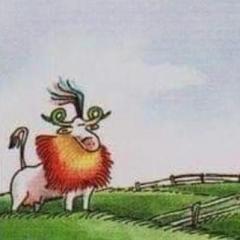
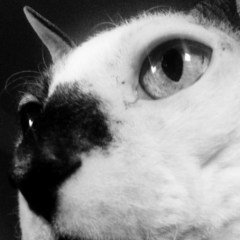
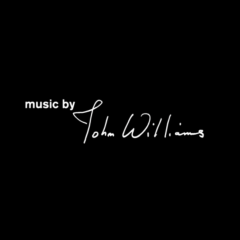
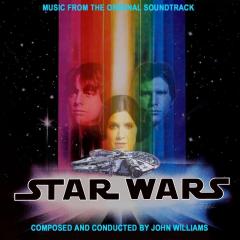
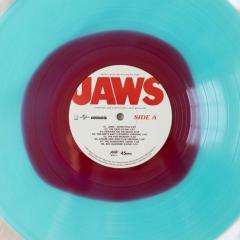
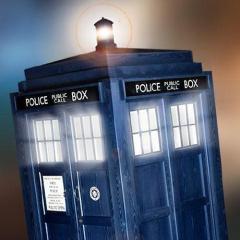
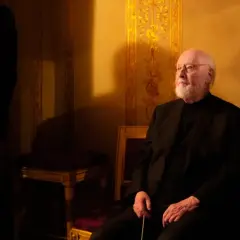
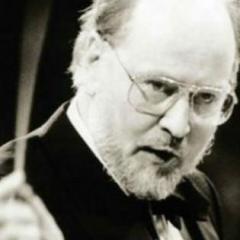
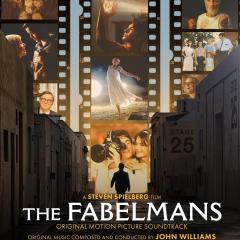

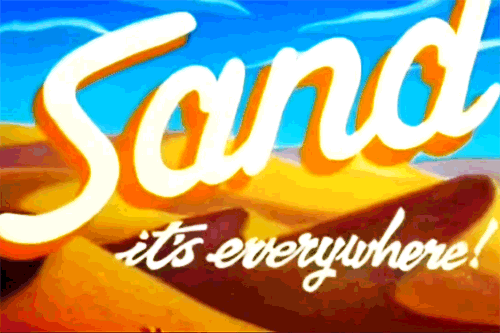
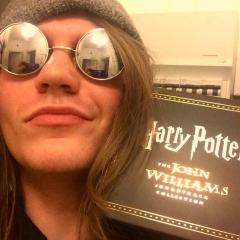
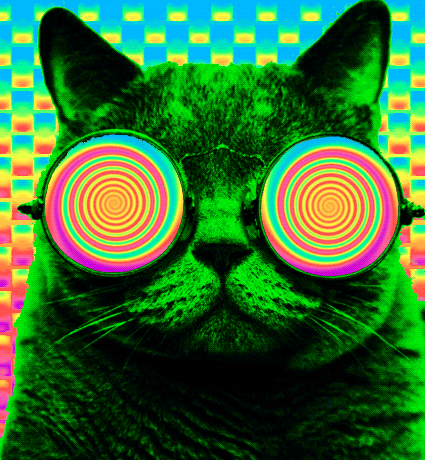
.thumb.png.99648892217b423e18fe027415380d39.png)
